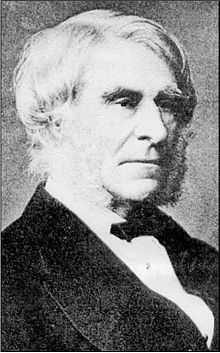Robert Christison

Sir Robert Christison, 1st Baronet FRSE FRCSE FRCPE (18 July 1797 – 23 January 1882) was a Scottish toxicologist and physician who served as president of the Royal College of Surgeons of Edinburgh (1838 and 1846), as president of the Royal College of Physicians of Edinburgh (1838–40 and 1846-8), and as president of the British Medical Association (1875).[1]
Christison was born in Edinburgh and attended the Royal High School and graduated at the University of Edinburgh in 1819. He then spent a short time in London, studying under John Abernethy and Sir William Lawrence, and in Paris, where he learnt analytical chemistry from P. J. Robiquet and toxicology from M. J. B. Orfila. In 1822 he returned to Edinburgh as professor of medical jurisprudence, and set to work to organise the study of his subject on a sound basis. On poisons in particular he speedily became a high authority; his well-known treatise on them was published in 1829, and in the course of his inquiries he did not hesitate to try such daring experiments on himself as taking large doses of Calabar bean (Physostigmine). His attainments in medical jurisprudence and toxicology procured him the appointment, in 1829, of medical officer to the crown in Scotland, and from that time until 1866 he was called as a witness in many celebrated criminal cases.
In 1832 Christison gave up the chair of medical jurisprudence and accepted that of medicine and therapeutics, which he held until 1877; at the same time he became professor of clinical medicine, and continued in that capacity until 1855. His fame as a toxicologist and medical jurist, together with his work on the pathology of the kidneys and on fevers, secured him a large private practice, and he succeeded to a fair share of the honors that commonly attend the successful physician, being appointed physician to Queen Victoria in 1848 and receiving a baronetcy in 1871. Among the books which he published were a treatise on Granular Degeneration of the Kidneys (1839), and a Commentary on the Pharmacopoeias of Great Britain (1842). Sir Robert Christison, who retained remarkable physical vigour and activity down to extreme old age, died at Edinburgh on 23 January 1882.
Works
- A Dispensatory, or Commentary on the Pharmacopoeias of Great Britain : comprising the natural History, Description, Chemistry, Pharmacy, Actions, Uses, and Doses of the Articles of the Materia Medica.
2nd Ed. with 213 Ill. / by R. Eglesfeld Griffith. Philadelphia : Lea & Blanchard, 1848. Digital edition by the University and State Library Düsseldorf
References
- ↑ Waterston, Charles D; Macmillan Shearer, A (July 2006). Former Fellows of the Royal Society of Edinburgh 1783-2002: Biographical Index I. Edinburgh: The Royal Society of Edinburgh. ISBN 978-0-902198-84-5. Retrieved 27 December 2010.
 This article incorporates text from a publication now in the public domain: Chisholm, Hugh, ed. (1911). Encyclopædia Britannica (11th ed.). Cambridge University Press
This article incorporates text from a publication now in the public domain: Chisholm, Hugh, ed. (1911). Encyclopædia Britannica (11th ed.). Cambridge University Press
See also
|